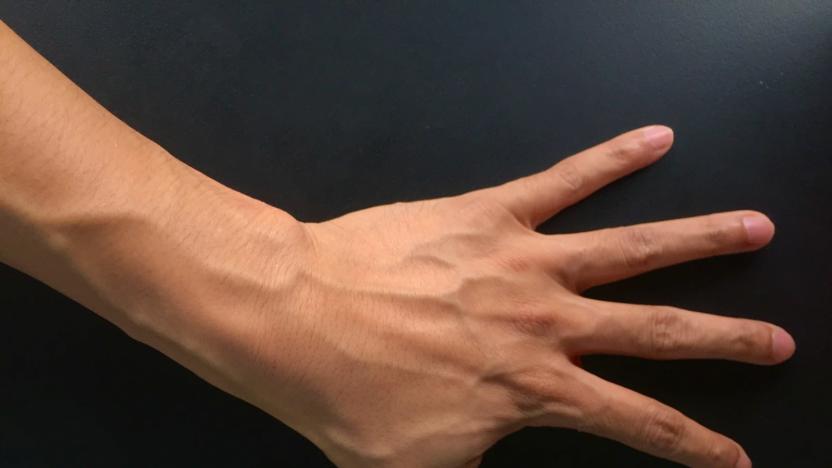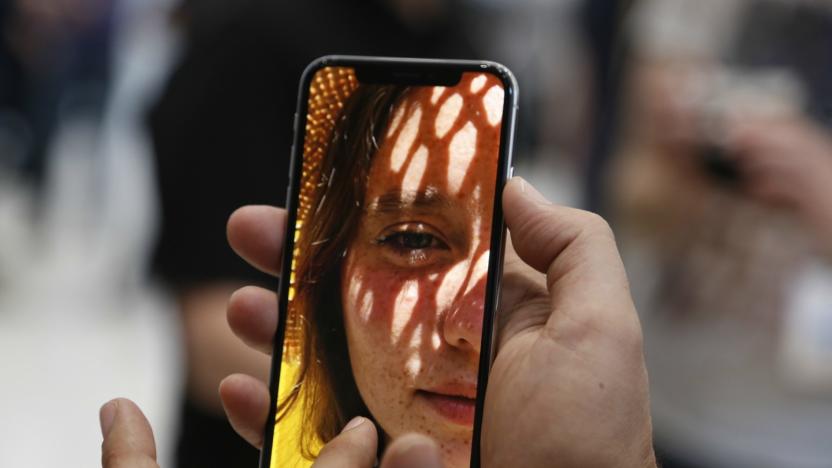BiometricSecurity
Latest

WhatsApp update lets you hide chats using Face ID and Touch ID
Instagram and Messenger could soon follow WhatsApp in introducing encrypted messaging as part of Facebook's plan to unify its app empire. In the meantime, WhatsApp is adding an extra layer of privacy on iOS with support for Touch ID and Face ID. The update (version 2.19.20) allows users to lock their messages behind their iPhone's biometric authentication features. You can switch it on by heading in to settings, selecting Account, Privacy and "enable Lock Screen." You'll then be able to set a time limit immediately, after a minute, 15 minutes or 1 hour.

Hackers defeat vein authentication by making a fake hand
Biometric security has moved beyond just fingerprints and face recognition to vein-based authentication. Unfortunately, hackers have already figured out a way to crack that, too. According to Motherboard, security researchers at the Chaos Communication Congress hacking conference in Leipzig, Germany showed a model wax hand that they used to defeat a vein authentication system using a wax model hand.

Bournemouth bars have begun accepting a smartphone app as ID
I went to university in Bournemouth and remember fondly (and not so fondly) queueing for overpriced bars with housemates and other trainee journalists. Every Monday night was the same -- I would stand outside in the freezing cold, slowly shuffling forward until someone in my group uttered the groan-inducing phrase: "I've forgotten my ID." Oh, how times have changed. A bunch of nightclubs including Cameo, Halo, Truth, Yates and Walkabout have started accepting Yoti as an ID and proof of age. The smartphone app is supposed to be fast, secure, and more convenient because you can leave your passport and driving licence at home.

Apple responds to Sen. Al Franken’s Face ID concerns in letter
Apple has responded to Senator Al Franken's concerns over the privacy implications of its Face ID feature, which is set to debut on the iPhone X next month. In his letter to Tim Cook, Franken asked about customer security, third-party access to data (including requests by law enforcement), and whether the tech could recognize a diverse set of faces.

Apple questioned about Face ID security by the US Senate
A lot of people quickly raised concerns about privacy and security the moment Apple revealed iPhone X and its Face ID feature. Edward Snowden, for instance, thinks it normalizes face scanning, "a tech certain to be abused." Now, US Senator Al Franken is pressing the tech titan for answers, penning a letter addressed to Apple chief Tim Cook with a list of questions concerning the technology's "eventual uses that may not be contemplated by" its customers.

BioSoles know you're you within three steps, deter shoe bandits
It's no secret that everyone has a unique swagger -- so much so it can be used for identification. Many are working on this for biometric security, including a team at Carnegie Mellon University and Autonomous ID, who are collaborating on shoe insoles that monitor pressure and gait to confirm the identity of the wearer. So far, tests have shown a detection rate above 99 percent within just three steps, meaning they can alert you before that opportunist even makes it out of the locker room. It's thought the cloud-connected BioSoles could be implemented in security access, although we're not sure this offers advantages over similar, static technology also in development. We do, however, like the idea that subtle changes in your strut could be used to provide early indications of conditions such as Alzheimer's, Parkinson's and diabetes. It's likely that the insoles won't be available any time soon, so until then, keep an eagle eye on those expensive kicks.

Fujitsu's super-slim, super-powerful phones could come to Europe
We've been enviously eyeing Fujitsu's super-thin, super-powerful phones for a very long while. At CES, we were able to swing an early look at its unnamed Tegra 3 Arrows prototype and the question we asked, over and over, was if we'd ever see these devices in the west. A knowing smile followed with the response that it would "depend on the carriers involved." A report in the Financial Times seems to confirm that the company's planning to take Europe by storm as it unveils the finished model at next week's Mobile World Congress -- albeit with the same caveat that carriers are still yet to sign on. The report adds that Fujitsu will include biometric security, NFC and LTE in all future handsets: just more teasing for those nations still to adopt the standard.

Biometric ear scanning developed as a comical alternative to iris, fingerprint scans
The field of biometrics is a never-ending spectacle of palm readers, fingerprint and iris scanners, and now researchers at the University of Southampton may have discovered the next body part to be cataloged and tracked by power-mad governments: the ear. According to Professor Mark Nixon, the human ear is made up of "a whole load of structures" that can generate measurements that are unique to an individual. "With facial recognition," he says "the systems are often confused by crows feet and other signs of aging. Your ears, however, age very gracefully. They grow proportionally larger and your lobe gets a bit more elongated, but otherwise your ears are fully formed from birth." And unlike iris scanning, which is a cumbersome process, the ear scanning is relatively quick and painless. Unless, of course, you're dealing with long-haired hippie radicals. If they rise up again, no amount of ear scanning will keep us safe.

Aegis Bio grows to 640GB of fingerprint-protected storage
Apricorn specializes in the fine art of making people believe their data is worth stealing and charging them for the privilege of protecting it. Its Aegis Bio range has now been expanded, both in number and in capacity, as the former ceiling of 250GB has been lifted with the introduction of 320GB, 500GB and 640GB variants. The 2.5-inch external disk validates user identity with that handy fingerprint scanner on top before allowing access to the otherwise 128-bit encrypted precious stuff within it. Prices of the new models top out at $160 for the most voluminous one, making them thrifty enough to buy even if you don't need secret agent-level security -- which, let's face it, you don't. Full PR after the break.

Typing 'cadence' used to identify authorized database users, lock everyone else out
We'll admit to having shared a few login credentials amongst friends here and there in our younger days, but it sounds like the party might soon be over: a company called Scout Analytics has developed a way of identifying a user's "typing cadence," and matching it to how a username and password are entered. It only takes 5 login attempts of around 12 characters for Scout to nab your cadence, and although 1 in 20,000 people will share the same cadence, combining the data with browser info and IP addresses makes it accurate enough for general usage. No word on what sites are using this technique, but we won't be surprised if it starts popping up rapidly -- and sniffing typing cadences becomes the next great malware scourge. P.S.- Yes, we just wanted to run the picture of the keyboard pants again. Seriously, can someone please hook us up with those?

Axxis fingerprint door lock invites hacker wannabes to burgle your premises
Biometric security might sound cool, but relying on fingerprint recognition alone for securing anything more serious than your Windows password typically results in the rapid hacking, whether through flesh or software, of that protection. Well, Axxis is trying to address this problem with a new dual-factor security lock -- requiring a PIN alongside fingerprint identification -- which allows you to customize access times for each registered user and also spy on their comings and goings. Retailing for $699 per lock, alongside an entirely-not-optional $299 accessory, this is hardly a bargain bin item -- with a price like that, a burglar might be inclined to steal the locks instead of your treasured possessions.

BioMirage Coffer offers biometric security for people with money to waste
It's not every day that we see gear aimed at "forward-thinking and discerning social elites" -- if anything, it seems that the most high-falutin' types are looking for ways to stay out of our orbit. Then again, our idea of security usually involves Lego safes and Nintendo deadbolt hacks. When we learned that "true peace of mind" could be ours once we had our hot little hands on the BioMirage Coffer -- a 16.4 x 10.6 x 5.8-inch, 10.4 lb strong box featuring biometric fingerprint authorization and a USB key -- our ears perked up. We're not sure what this thing's made of (or that it couldn't be smashed open if you were so inclined), but who wouldn't want to own a gadget that "epitomizes symbiotic interactions between people and technology?" Wait... this thing's $579? We'll pass.

UPEK Eikon To Go RSA key comes with a built-in fingerprint reader
Although RSA's SecurID two-factor authentication system is pretty solid (except for when the keys go out of sync), it looks like organizations with even more stringent security requirements might be interested in UPEK's new Eikon To Go RSA key, which adds a fingerprint reader to the mix. Yep, nothing really too wild -- but it's definitely one of the cooler-looking SecurID keys we've seen out there.

Pantech releases PG-6200 securityphone in Taiwan
Pantech has just released a new handset for the security-conscious Taiwanese citizen who also wants some pretty capable multimedia features in his/her cellphone. To keep sensitive data out of the wrong hands, the tri-band PG-6200 features a fingerprint scanner rather curiously placed right above the smudge-prone two megapixel camera lens, along with a music player that handles MP3 and AAC files from either the 20MB internal memory or a microSD card. Other nice touches include Bluetooth (no word on A2DP compatibility, though) and JAVA 2.0 so you can get your Opera Mini-on, along with the obligatory email, SMS, and MMS functionality. [Via textually]





